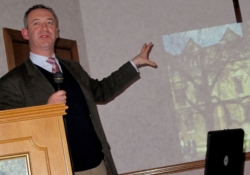Harmony makes good art and good business, says Legatus speaker
WESTON -- Some would say art does not apply to running a business, but that is not so, according to a New Hampshire art professor.
David Clayton, the artist-in-residence at the Thomas More College of Liberal Arts in Merrimack, N.H. showed local business leaders how art, the divine order and harmony in nature applies to economics and business management at a meeting of the Boston chapter of Legatus, an international organization of Catholic business leaders, Feb. 25 at St. Julia Parish.
Boston’s Legatus group meets monthly for Mass, confession and dinner featuring a keynote speaker.
Clayton, who recently launched the Way of Beauty program at the Catholic liberal arts college to teach students about Catholic artistic traditions and how to apprehend beauty in nature, talked to the group about how the same elements that make beauty in art and nature can make companies and corporations more productive and profitable.
In his remarks, Clayton suggested that as there is natural order and harmony in nature, business and commerce can be in line with the common good. When that happens, he said, productivity and profits can increase.
“There can’t be conflict in any way,” he said.
As an example, he said that two separate musical chords fuse together to create another element, which he compared with the Trinity by saying there are three separate elements forming one God.
The same principles of natural order and harmony, he said, apply in any human relationship. In a covenantal relationship, which Clayton said is God’s relationship with his people, each person is interested in the well-being of the other.
“It’s not something that can be faked. Either I care or I don’t,” Clayton said. “When that is there, it allows me, it allows the organization as a whole, to do what it aims to do.”
He also said God, the Creator, is the source of creativity. When the creator works through people, Clayton said, he opens them to ideas more “in line with the common good.”
The importance of beauty, he said, is that it attracts people to one another and the recognition of beauty opens humans to love and serve.
“It is the beauty of creation which gives praise to God,” he added.
He concluded his presentation with photographs of European landmarks that he says illustrate natural order.
Following the meeting, attendees reflected positively on Clayton’s remarks.
Andy Lavallee, owner of LaVallee’s Bakery Distributors, said that applying Clayton’s insights to the business world is a “given.”
“The public’s perception is that entrepreneurs are this greedy group of people. If you can take it and bring it back to the basic biblical principles of love and servanthood, you can apply that day in and day out as a leader and leave it up to God,” LaVallee said. “(God) will grow your business. If it is his will, it’ll come to you.”
Al Lagan, chairman of Congress Asset Management, also found Clayton’s remarks insightful.
“It opened up areas of looking at the world and looking at the environment in a totally new way,” Lagan said. “I never realized the beauty that God created and put into this world and all we have to do is look at it.”
“It takes a conscious effort to look at the world, effort to see the world this way,” Lagan added. “First you have to realize it all comes from God and the Trinity.”



















